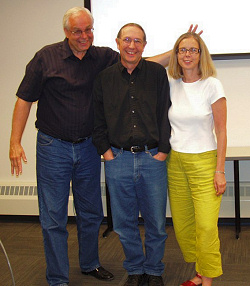 |
Issue 21 (1/2007)
|
|||
|
FSD Bulletin is the electronic newsletter of the Finnish Social Science Data Archive. The Bulletin provides information and news related to the data archive and social science research.
|
ICPSR Summer Course Provided New Ideas for FSD's Information ServicesThe ICPSR (Inter-university Consortium for Political and Social Research) Summer Program at the University of Michigan (US) offers courses to the international social science research community. In the summer of 2006 I travelled to Ann Arbor to get new ideas and perspectives for FSD's information services. A week of intensive studies
The course I attended, Providing Social Science Data Services: Strategies for Design and Operation, was a hands-on, compact five-day course. The 16 participants came from US, Canada, Jamaica etc., myself being the only European. The teachers, Diane Geraci, Chuck Humphrey and Jim Jacobs had been teaching ICSPR summer courses for years and were seasoned experts. The teaching methods and materials formed a concise package covering all the crucial issues. Each eight-hour day contained both theory and practical exercises. We were also given homework. Research data from different viewpointsDuring the course we covered long-term preservation and archiving of data, open access to data, basic statistics, and discussed quantitative and statistical literacy. One theme pertained to metadata, i.e., to the significance of documentation for the searching, finding and reusing data. In practical exercises we used statistical packages like Stata and SAS, made online searches on the Internet, downloaded ICPSR data files, and analysed data. Course participants gave presentations on their own organizations, covering data resources, information services, marketing, data users and depositors, and networks. A SWOT analysis was carried out to find out how the services could be developed. For me personally, the discussions on how archives can support the users of archived data and enhance secondary use of data were particularly useful.
|
